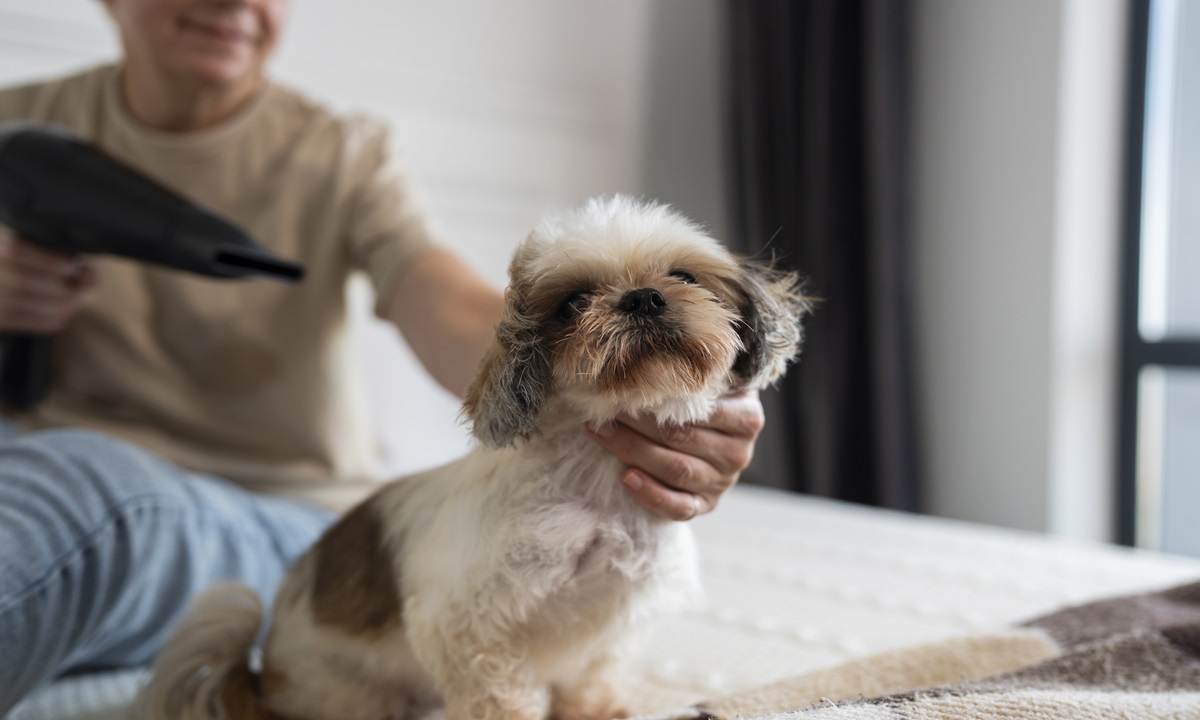As our beloved pets age, their needs evolve, requiring us to adjust our care routines to ensure they remain happy and healthy. In this comprehensive guide to senior pet care, we’ll explore essential tips on nutrition, exercise, managing age-related health issues, and enhancing their emotional well-being. Our goal is to equip you with the knowledge and tools necessary to support your senior pet through their golden years with grace and comfort.
Table of Contents
ToggleUnderstanding the Aging Process in Pets
Signs of Aging in Pets
Just like humans, pets experience physical and behavioral changes as they age. Look out for
Decreased Energy: Pets may become less active and sleep more.
Changes in Coat: Graying hair or fur loss can occur.
Joint Stiffness: Difficulty in movement, especially after rest.
Weight Changes: Senior pets may gain or lose weight.
Behavioral Changes: Increased irritability or confusion.Recognizing these signs early allows for timely interventions to maintain their quality of life.
The Emotional Impact of Aging Pets
Aging pets may experience anxiety or discomfort due to physical limitations. Providing a calm and supportive environment, along with regular affection and reassurance, helps alleviate their stress. Your presence and attention play a crucial role in their emotional well-being during this sensitive time, making it an essential aspect of senior pet care.
Nutrition for Senior Pets
Dietary Needs of Senior Pets
Senior pets have unique nutritional requirements to support their aging bodies
Protein: High-quality proteins like chicken or fish help maintain muscle mass.
Fat: Essential fatty acids promote a healthy coat and skin.
Fiber: Aids digestion and prevents constipation.
Antioxidants: Combat cellular damage and support the immune system.
Choosing the Right Senior Pet Food
Opt for senior-specific formulas that cater to their specific needs, such as
Lower Calories: To prevent weight gain.
Joint Support: Added glucosamine and chondroitin for mobility.
Digestive Health: Probiotics and easily digestible ingredients.
Top Brands and Formulas
Hill’s Science Diet Senio
Royal Canin Aging
Blue Buffalo Life Protection Senior
Supplements for Senior Pet Health
Enhance their diet with supplements that address common senior pet issues
Glucosamine and Chondroitin: Supports joint health and mobility.
Omega-3 Fatty Acids: Reduces inflammation and supports heart health.
Multivitamins: As part of senior pet care, fill in nutritional gaps in their diet by introducing supplements gradually and under veterinary guidance to ensure they complement their diet effectively.
Exercise and Mobility for Senior Pets
Importance of Regular Exercise
Even in their senior years, exercise is a crucial part of senior pet care, helping to maintain muscle tone, joint flexibility, and mental stimulation.
Improved Cardiovascular Health
Weight Management
Enhanced Mood
Safe Exercise Routines for Senior Pets
Tailor exercise routines to their abilities
Short Walks: Gentle walks stimulate circulation without overexertion.
Low-Impact Activities: Swimming or gentle play.
Interactive Toys: Mental stimulation through playtime.
Mobility Challenges in Senior Pets
Help them overcome mobility issues with
Orthopedic Beds: Provide joint support and comfort.
Ramps and Steps: Assist pets in accessing higher surfaces.
Harnesses and Slings: Senior Pet Care includes aiding mobility during walks. Regular exercise and mobility aids prevent muscle atrophy, and stiffness, and enhance your pet’s quality of life.
Managing Age-Related Health Issues
Common Health Issues in Senior Pets
Be vigilant for age-related conditions such as:
Arthritis: Causes pain and stiffness in joints.
Dental Disease: Gingivitis and tooth loss.
Cognitive Decline: Confusion and memory loss.
Regular Veterinary Care
Schedule bi-annual veterinary check-ups to monitor
Weight: Ensure they maintain a healthy weight.
Dental Health: Regular cleanings and dental exams.
Blood Tests: Screen for early signs of diseases like kidney or liver issues.
Home Care Tips for Senior Pets
Create a comfortable and safe environment
Soft Bedding: Cushion joints and provide warmth.
Accessible Food and Water: Raised bowls for easy access.
Routine: Maintain a consistent schedule for meals, walks, and playtime.
Emotional and Mental Well-being
Mental Stimulation for Senior Pets
Keep their minds active with
Interactive Toys: Puzzle feeders or treat-dispensing toys.
Training Exercises: Teach new tricks or commands.
Daily Routine: Predictable routines reduce anxiety.
Emotional Bonding
Senior pets thrive on companionship and love
Quality Time: Cuddle, groom, or talk to your pet.
Positive Reinforcement: Reward good behavior with treats.
Comfort: Provide familiar blankets or toys for security.
Specialized Care for Different Pets
Caring for Senior Dogs
Senior dogs may require
Gentle Exercise: Moderate walks to maintain muscle tone.
Joint Supplements: Support mobility and manage arthritis.
Weight Management: Ensure a balanced diet to prevent obesity.
Caring for Senior Cats
Aging cats benefit from
Dental Care: Regular tooth brushing or dental treats.
Kidney Support: Moist food diets to aid hydration.
Environmental Enrichment: Vertical space and scratching posts.
Caring for Other Senior Pets (Rabbits, Birds, etc.)
Tailor care routines for
Rabbits: Provide soft bedding and regular grooming.
Birds: Nutrient-rich diets and mental stimulation with toys.
Advanced Care for Senior Pets
Palliative Care for Senior Pets
Focus on comfort and quality of life
Pain Management: Medications or supplements for pain relief.
Comfortable Environment: Quiet spaces and soft bedding.
Emotional Support: Spend quality time and provide reassurance.
Hospice Care for Pets
Prepare for end-of-life stages with
Pain Relief: Ensure they are comfortable and pain-free.
Quality Time: Cherish moments and create lasting memories
Grief Support: Seek support from pet loss groups or counseling.
Technology and Senior Pet Care
Innovative Products for Senior Pet Care
Technology aids in monitoring and care
GPS Trackers: Locate pets if they wander.
Automatic Feeders: Ensure regular feeding times.
Health Monitors: Track vital signs like heart rate and activity levels.
Using Pet Monitoring Systems
Monitor your pet’s health and behavior
Remote Access: Check in on pets when away from home.
Early Detection: Detect changes in behavior or activity.
Peace of Mind: Ensure they are safe and well cared for.
Community Support and Resources
Online Communities for Senior Pet Owners
Connect with other pet owners for
Advice and Tips: Share experiences and solutions.
Emotional Support: Discuss challenges and successes.
Expert Guidance: Receive vet-approved information.
Support Groups for Pet Loss and Grief
Find comfort and understanding
Grief Counseling: Process emotions related to pet loss.
Memorialization: Create tributes to honor your pet’s memory.
Healing: Move forward with support from others who understand.
Conclusion
Caring for senior pets requires dedication, patience, and a deep understanding of senior pet care, which involves addressing their evolving needs as they age. By providing proper nutrition, exercise, regular veterinary care, and emotional support, you can ensure your senior pet enjoys a comfortable and fulfilling life. Cherish each moment together and celebrate the joy they bring to your life.
(FAQs)
How can I tell if my pet is in pain?
Watch for changes in behavior, such as decreased appetite, excessive grooming, or reluctance to move, as these are important aspects of senior pet care. Consult your vet for pain management options.
What are the best exercises for senior pets with arthritis?
Low-impact exercises like swimming or gentle walks are ideal. Avoid strenuous activities that could exacerbate joint pain.
What should I look for in a senior pet food?
Choose formulas with high-quality proteins, joint-supporting ingredients like glucosamine, and easily digestible components. Avoid excessive fillers and additives.
How can I help my senior pet maintain a healthy weight?
Monitor their food intake, provide regular exercise, and adjust portion sizes based on their activity level and age-related metabolism changes.
When should I consider hospice care for my pet?
Discuss with your vet when your pet’s quality of life is declining despite treatment. Hospice care focuses on comfort and dignity in their final stages. This detailed guide on senior pet care empowers you to provide the best care for your senior pet, ensuring they live their golden years with dignity and comfort.






